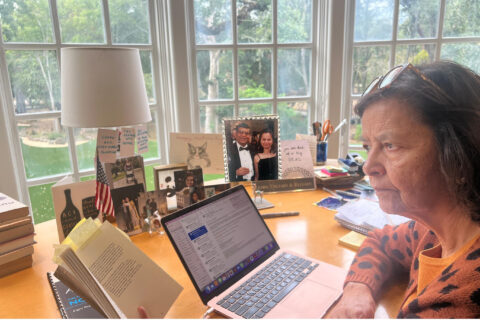
A few weeks ago we memorialized the 20th anniversary of the 9/11 attacks, when foreign terrorists tried to destroy our political and economic system. On Jan. 6, 2021, our domestic terrorists attacked the Capitol to overthrow the election results. The attack threatened the very foundation of our democracy — the peaceful transition of power. It is our constitutional right to demand fair elections, but when protests are violent, they are criminal.
We fought COVID-19 by developing a vaccine, but people who have refused to be vaccinated are like drunk drivers—endangering their own lives and those of their fellow Americans.
By most measures, rejecting a vaccine that has proven safe and effective is irrational. Are these protests at the expense of submerging our objectivity?
Or is it a symptom of identity crises?
Our daughter, Serena, decided to take a gap year between high school and college. She spent part of her gap year at the Students’ Educational and Cultural Movement of Ladakh (SECMOL) more than 10,000 feet in the Western Himalayas. Ladhak is a sparsely populated province. Serena volunteered to teach math and English to high school girls from underserved communities who had failed their final exams. She discovered that the girls came to her class after cooking a full meal for the family, and when they went home, they helped take care of their siblings.
Upon her return to the U.S., Serena shared how these girls her age carried tremendous responsibilities. To her, their lives were meaningful and had a purpose that involved more than getting into a prestigious college, even though the domestic chores compromised their school performance. She was obviously struggling deeper within to find her greater purpose.
Conflicts are natural when our desires are different from the expectations that others have of us. Resolving these conflicts is not easy.
According to the European Journal of Psychology, “Erikson’s (1994) psychosocial stages support the notion that younger people search for identity and purpose in life. Erikson (in his book in 1968) reported that having purpose in life will enable young people (ages 13 and 21) to deal with their identity problems.”
In Man’s Search for Meaning, Viktor Frankl, a psychologist and Holocaust survivor, offers a deeper explanation, “Meaning for life is the primary motivational force (for good mental health).” Above all, Frankl says, people want to live a life that has meaning — which can be different at different times.
As American society has become more complex — personally, politically and intellectually — new tensions have surfaced in the American social fabric. If these tensions remain unresolved, they will precipitate an identity crisis in society.
Further, when our instincts, logic and efforts do not find answers, we become prone to rhetoric and slogans or succumb to pressures to choose sides. This trend will not only set us back but make us vulnerable. It is the latter what we are experiencing: vulnerability.
Our brains try to resolve conflicts to conserve energy, rightly or wrongly. Yale Scientific calls energy conservation the Neural Thermostat of the brain.
This state has been fostering for some time in America — the unresolved problems of gun violence, reproductive rights, climate change, fiscal conservatism, equity, and capitalism vs. safety nets.
Some argue societies are inherently prone to going through ups and downs, because of their natural evolution.
National Geographic writes, “Civilizations have flourished and then failed or fallen apart. .. Causes of fall of civilizations have been: internal change, external pressure, and environmental collapse. The fall of civilizations is never the result of a single event or pattern.”
To prevent becoming a victim of our progress, we, the Americans, can perhaps set greater goals.
Psychological studies have revealed that fear brings about what one is afraid of, and hyper-intention makes it impossible to achieve what one wishes.
The same is happening to us collectively. Despite trying hard, and focusing we have not been able to move the ball forward on any of these critical issues.
Psychotherapy might also offer some possible solutions. The personal identity crises are resolved and a meaningful life is more likely when we are focused on others instead of ourselves. Perhaps a similar approach is needed to resolve our deeper societal problems.
World War II left Western Europe and much of Asia in shambles. Before the war, the US was in an economic depression. When World War II ended, there was widespread fear of nuclear weapons. However, the US passed Marshall Plan to help rebuild Europe. European countries decided to work more cohesively by prioritizing the well-being of their neighbors. They built welfare states and formed EU. With its pluses and minuses, the results were incredible.
Since then, America has come as close to the dreamland as it gets. But now after almost 250 years, we are coming apart at the seams. But psychology explains how conflicts or constructive tensions are not only essential but healthy. They help us find meaning in life.








Hemant Lall
Kudos to Serena and the girls on the foothills of Himalayas. They inspire us in our endless endeavor to find the meaning of life.
Hemant
Vijay Gupta
A person’s identity consists of several components:
i) Inherited individual identity–based on DNA, race, gender, and other unalterable physical attributes.
ii) Inherited group identity–based on the parents’ religion, culture, language, and nationality.
ii) Acquired or adopted identity–based on where one chooses to live, and other circumstances of one’s life.
Until about 1960, most Americans were a relatively homogeneous group with an identity that could perhaps be best described as ‘white anglo-saxon protestant.’ But according to the 2020 census, the US has become a very heterogeneous nation–both racially and culturally. Moreover, religion no longer plays as significant a role in people’s lives as it once did. Hence it no longer provides the social glue that helped create a cohesive group identity in the past.
A national identity cannot be created by a diktat. People adopt an identity that appears most realistic, beneficial, and meaningful to them. Often, adopting an identity simply amounts to emphasizing or de-emphasizing certain components of one’s identity. However, an individual cannot simply create any identity they wish. A black person cannot simply choose to de-emphasize his race if others insist on seeing him through the lens of race.
Vijay Gupta
R K Agarwal, UOR-73, ELECRICAL
The thought process evoked by the writer is credible and is very much relevant at a personal level, national and international level. To analyse it more critically, one may find the problem with Pakistan today, an utmost identity crises and a total loss of sense of purpose, while its neighbour India is very much focussed on its progress and overall wellbeing of its people. India also lost this sense of purpose, some what , before present political dispensation, almost for about a decade and also earlier for few years here and there. The need for the nation is to maintain current sense of purpose for few decades, to catch up with the USA and become a world leader, as USA remained one for a century or so.
Rajvir Singh
Excellent!
Please post in a widely read media. Timely and much needed!
Prakash
Purpose and meaning are high level ideas. A certain honesty is required for a proper understanding of these concepts. Let me just given one example. I checked the linked National Geographic article and went though the whole article and the pictures below.
There is no direct mention of Indian Civilisation, which perhaps is the only surviving ancient civilisation in its essential form. India is mentioned only as an end-point till which other civilisations reached. It is clear that the author of that article is either patently dishonest or primarily ill-informed.
Reminds me of Mahatma Gandhi. Someone asked him what he thought of western civilisation.
‘It is a good idea’, He quipped.
Deepka
Serena’s work in Ladhak is admirable. She has found the purpose of life at such a young age!
Very well written article, I’ve to reread it to grasp it.